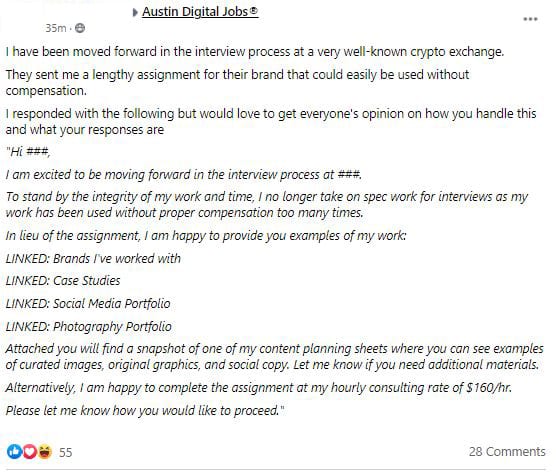When And How To Say No To Job Interview Projects

This post is written by Scott Beardsley and Damien Richburg.
Among the more controversial aspects of hiring right now is when companies assign projects for job candidates to complete. These “tests” are typically one of the final steps of the hiring process, and the assignments can vary in scope.
We’re not talking about personality assessments, either. Companies will assign projects that closely resemble the tasks of the job that the candidate is applying for.
From a company’s standpoint, evaluating how qualified someone is for a job is easier if they can see how well someone can perform at least part of the role. So it reduces the risk of hiring.
On the flip side, candidates are becoming frustrated by taking hours to complete projects when:
- It’s unclear how many other candidates they’re up against for the job
- They’re not being compensated for their time
- The work can be used by the company even if the candidate is not hired
- They don’t know the consequences of saying no or pushing back on the request
This topic surfaced recently on the Austin Digital Jobs Facebook group.
 Why We Do Not Like Job Interview Projects
Why We Do Not Like Job Interview Projects
These are the reasons why we think hiring projects are problematic for both sides.
- Reveals a larger issue: If a company must use projects to evaluate candidates, it indicates that they can’t gauge applicants accurately using traditional methods. This tells us that they’re either being lazy or ineffective in other parts of the hiring process.
- Reputational risk: When companies go overboard relative to the complexity of the projects that they assign, it’s exploitative. It feels like free consulting to candidates, who leave with a bad taste – i.e. if this is what they ask me to do for free, I wonder what they’ll ask me to do once they’re paying me.
- It can backfire: Competition for talent is extremely high. If your company requires candidates to complete projects, but other companies that candidates are considering do not, guess who’s at a disadvantage?
- Only tells part of the story: Projects do not tell a complete story about a candidate, so companies need to be careful how much weight they assign to a project. For instance, projects have little relevance to management roles, which require leadership skills, collaboration, and interaction.
- Does it work both ways? There’s a give-and-take to hiring processes, and projects are one-sided. Would the hiring managers who request projects from candidates do the same thing in return (i.e. complete a project so the candidate can tell if they’re a good supervisor)? Probably not.
- Open to manipulation: Companies who hail the merits of projects are naive if they think candidates can’t get outside help to improve their performance. So assigning projects can create an uneven playing field.
An exception to these rules is when tech companies assign candidates coding exercises. These often are given to individual contributors, and we see these as important to evaluate how proficient someone knows a coding language.
Even these tests can go out of bounds, though, if companies ask for a real deliverable or for something that takes an inordinate amount of time to finish.
How To Push Back on Job Interview Projects
Job interview projects likely won’t go away anytime soon, so candidates must ask themselves how badly they want a job before deciding to complete a test or project.
If the deliverable is something that can be used in a real work scenario, we recommend that candidates protect their work by asking companies to sign an NDA (free NDA templates are available online).
It’s fair to ask a company to compensate you for your time, but don’t expect them to say yes, especially if the job is in high-demand and many other candidates are willing to do the work for free.
Ultimately, it’s best to have alternatives so that you don’t feel pressured to complete the project because your options are limited.
Need career help? Email us at sales@recruitAbility.ai for a free resume consultation. Are you a company looking for help with your hiring process? Email us at sales@recruitAbility.ai.